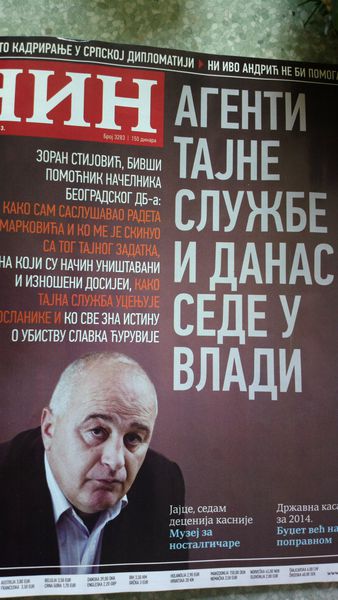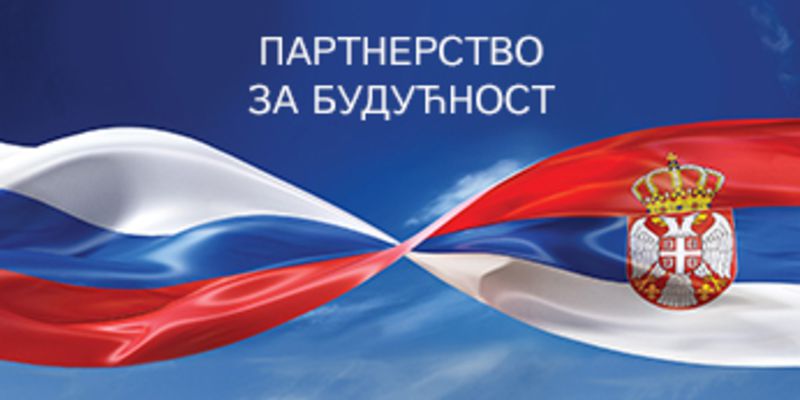Serbia and Bulgaria - Euro-integrational Twins
Adelina Marini, December 13, 2013
If ever a European enlargement commissioner would ask me what I thought about Serbia's progress toward European accession, I would tell him/her: "Watch Bulgaria and think about Serbia". If he/she would ask me for more details, I would recommend him/her to drive across Serbia and Bulgaria and take notes. I would guide him/her to watch specifically for basic things like the technical condition of the auto park which clearly speaks of how the technical checks work in the country; and also to pay attention to the striking price gap between very old cars and super luxury models sometimes are still not presented officially in car shows; I would also ask him or her to focus on the relationships between drivers on the road; to watch how do the customs officers work. But what would give the clearest perspective about the great closeness between the two neighbouring countries is what media and society talk about.
 I, for instance, on my way to Bulgaria two weeks ago bought from a gas station in Serbia two of the Serb most serious political weeklies. In Nin, which is published in Cyrillic, in three articles in a row can be read strikingly familiar things. The first big article is, in fact, an interview with Zoran Stijovic, a former operational worker in the secret services. The title of the article is in fact on the cover of the weekly: "Agents of the secret services are today still in government". The interview is spread on many pages and makes it clear that in Serbia, too, there was a period of destroying or hiding dossiers that are then used for a more predictable, to put it that way, management of key figures. There are agents among the chief editors of media, in Parliament, renown professors (it is not clear whether they were caught drunk in universities in violation of the rules as in Bulgaria), in the judiciary. All in all, just like in Bulgaria, the secret services are not at all former and not at all an end was put to the past.
I, for instance, on my way to Bulgaria two weeks ago bought from a gas station in Serbia two of the Serb most serious political weeklies. In Nin, which is published in Cyrillic, in three articles in a row can be read strikingly familiar things. The first big article is, in fact, an interview with Zoran Stijovic, a former operational worker in the secret services. The title of the article is in fact on the cover of the weekly: "Agents of the secret services are today still in government". The interview is spread on many pages and makes it clear that in Serbia, too, there was a period of destroying or hiding dossiers that are then used for a more predictable, to put it that way, management of key figures. There are agents among the chief editors of media, in Parliament, renown professors (it is not clear whether they were caught drunk in universities in violation of the rules as in Bulgaria), in the judiciary. All in all, just like in Bulgaria, the secret services are not at all former and not at all an end was put to the past.
Right after that shocking interview follows an article with the following title "Whom the bell tolls", which describes the "electoral calculations and the other combinations". In Serbia, there is a talk about early elections as of the first year of the current government. The problem is, though, that, just like in Bulgaria, these elections would be in fact a battle between the pro-Russian and the pro-European forces. "A scene is being established for geopolitical elections that we have never had before, but it is not certain that this will happen at the next elections", says for Nin Djordje Vukadinovic, a political analyst. He believes that, at this stage, the West is not interested in early elections in Serbia at least not until the implementation of the Brussels agreement is completed between Belgrade and Pristina, although the West will hardly want that after the start of the accession negotiations, too, because the current government seems sufficiently cooperative.
The Russians are not very inclined to back new elections either because even now they hardly manage to influence the government, but they worry that new elections might bring to power an even worse government. The difference with Bulgaria in this case is that in Sofia Moscow has a very cooperative government, but we should not forget that Serbia is doing its best to earn a beginning of accession negotiations. Moreover, Serbia has a special relationship with the Russians and their energy ambitions, which is clearly seen on entering Belgrade from the west. There a driver is met by a huge billboard praising the Serb-Gazprom friendship. The billboard has hanged there for years.
The next article in Nin is not less striking as an issue. It is about how Belgrade still has no diplomats in key capitals around the world, including in Washington, Berlin and Beijing. The author of the article, Dragana Pejovic, asks how is it possible, precisely at a time when Serbia is striving to start accession negotiations with the EU and when it is solving its issues with Kosovo, not to have ambassadors in key places. Nin's sources say, however, that for quite some time these countries do not need ambassadors because "it is a long practise the Serb foreign policy to be conducted from the cabinet of the most powerful person. Djindjic, Kostunica and Djindjic, then Kostunica and Tadic, and now Vucic", says a source from Washington. Now, key issues related to Serbia, but this is valid for many other Balkan countries, are not discussed via the normal political channels. Often State Department officials know more about the developments in Serbia than the ambassador himself.
"Regretfully, Serbia has brought itself to such a situation whereby officials can circumvent all the procedures and institutions and turn directly to the most powerful person in the state, because they have long understood that Serbia is not building institutions, but a cult of personality". This was especially true in Bulgaria with the previous government, but now it is not quite clear how things stand given that the current government visibly is working for the sake of someone who is behind the scene and whom Bulgarians have protested against for half a year.
Dear EU, demand a solution to the problem with the former regime first!
In my imaginary conversation with the enlargement commissioner I intend to tell him/her that there should be an entirely new chapter in the negotiations process or a sub-chapter. It should be dedicated on coming to terms with the totalitarian past. This means a complete lustration, bringing to light all those former agents who are in government and in key positions in the state, removing them, analysing the role of the secret services for the Serb society and the corruption they caused to the country. The European values, as the experience with Bulgaria suggests, cannot grow in an environment fed by state security, UDBA or Securitate. And it is indeed a pity that this topic does not get too much attention in Brussels and Strasbourg.
Last year I wrote for the first time about that when I read the list of proposed amendments to the resolution of the rapporteur on Serbia in the European Parliament, Slovene MEP Jelko Kacin (ALDE). This year, among the proposed amendments to Mr Kacin's report there are only two that draw attention to the problem. The first is a joint proposal by MEPs Andrey Kovatchev (EPP, Bulgaria), Tunne Kelam (Estonia, EPP) and Michael Gahler (Germany, EPP). They propose an entirely new text to be added to the resolution, saying the following: "Reiterates its call on the authorities to continue their efforts to eliminate the legacy of the former Communist secret services, as a step for the democratisation of Serbia; regrets the lack of political will and continues to encourage following the European Parliament's recommendations towards increase of parliamentary oversight and control over the security services, as well as of opening up the National Archives, and in particular the documents of the former communist intelligence agency, the UDBA; reiterates its call to the authorities to facilitate access to those archives that concern former republics of Yugoslavia and to return them to the respective governments if they so request".

The other proposal is also for a new text to the resolution and it belongs to László Tıkés (Hungary, EPP): "Calls on the Serbian government to enable the research of former dictatorial regimes, to rehabilitate both politically and judicially and to compensate former victims and their families who suffered thereunder in efforts to strengthen social cohesion and ensure lasting peace and justice in the context of Serbia's European integration process".
The other texts in Jelko Kacin's report and the proposed amendments show very clearly that the problems Serbia has are absolutely the same as those in Bulgaria. And if for Bulgaria and other countries that have not been diagnosed correctly and therefore an adequate treatment has not been undertaken another solution must be sought because they already are members of the EU, for Serbia it can be taken advantage of the fact that it is in the very beginning of the accession process. Serbia's Prime Minister Ivica Dacic is aware that the countries in the region are treated as lower quality. During his first official visit in Bulgaria on December 11th, he said that "the division of the Balkans creates an artificial picture of a split. The Balkans are treated as a region of lower quality. We have the obligation before our peoples, before our children's future, this picture of the Balkans to be overcome. This can only happen if the Balkan leaders cooperate in establishing the political, economic and any other interests".
It is not quite certain, however, whether Mr Dacic and his Bulgarian counterpart Plamen Oresharski are aware of where does the "lower quality" come from. If a focus is put on the issues that are in the foundation of all the problems, which are bad and deteriorating media environment, the mafiatised economy, the lack of rule of law and the availability of a dependent judiciary, then the Serb integration to the EU could prove the most successful so far. Otherwise, the EU risks to take another Bulgaria in, which is not at all a good advertisement of the European values globally, but especially in the close neighbourhood (or the close abroad after the Russian term).
 Bakir Izetbegovic, Andrej Plenkovic | © Council of the EU
Bakir Izetbegovic, Andrej Plenkovic | © Council of the EU Aleksandar Vucic, Recep Tayyip Erdogan | © Serbian Presidency
Aleksandar Vucic, Recep Tayyip Erdogan | © Serbian Presidency Jean-Claude Juncker, Zoran Zaev | © European Commission
Jean-Claude Juncker, Zoran Zaev | © European Commission